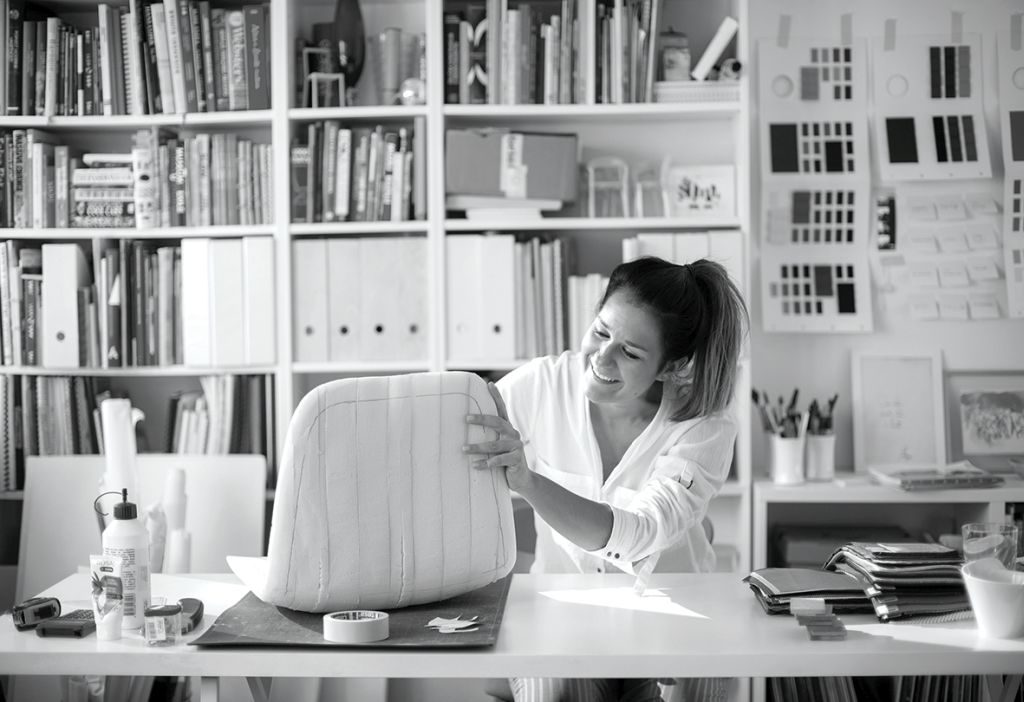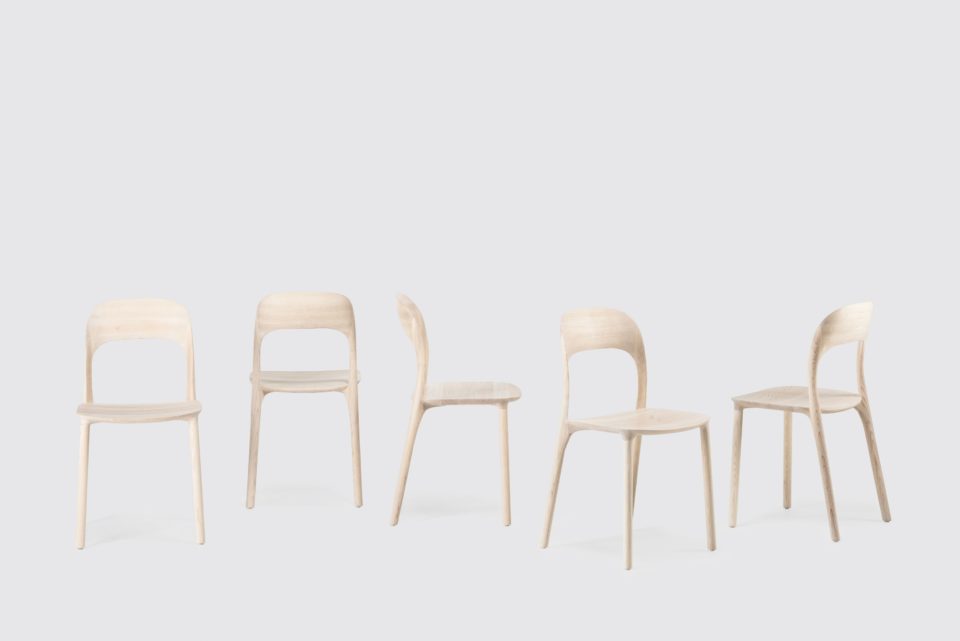
Nataša Perković is a designer, aesthete, and nature lover who strives to make eye-catching products that are also sustainable and have a positive effect on the environment.
Nataša Perković is a graduate of the Department of Product Design at the Academy of Fine Arts at the University of Sarajevo. Towards the end of her studies, she took part in an exchange at the Cittadellarte – Fondazione Pistoletto creative and cultural center in Italy, which, she says, really enriched her knowledge. After that, she interned at The Partners graphic design agency in London. There, she tells us, she learned how a design agency should be structured and about the important connections between design and business.
After this myriad of experiences, she returned to Sarajevo and started working with local companies. Her return to Sarajevo also marked the beginning of her academic career as an assistant to professors Zlatko Ugljen and Ognjenka Finci.
“I am grateful for the opportunity to learn how to encourage students to discover their aesthetic affinities and to realize their ability as creators. I am privileged to have the opportunity to lead the course, work with talented young people, and influence them,” says Nataša.
The BiH Design Scene
Her academic career helps her to set the bar high for her practical work. She wants her projects to contribute to the profession. Therefore, she turned to local furniture manufacturers when searching for partnerships.
“At that time, the furniture industry was maturing. For the first time after the war, it was ready to develop its own products, mostly for the international market. To do that, they needed designers. It is precisely those companies that have the potential to develop a product that can contribute to the profession. Several companies have emerged that have realized the advantage of their own product and created the market conditions to follow that path. This is even more complex than it sounds. It’s like heading out across the sea in the dark, in a small boat with a small engine, instead of staying on the shore. I think every Bosnian businessperson who develops their own brand is a brave adventurer. It is extremely interesting to be a part of that adventure,” she tells us.
Nataša believes that furniture design in BiH has high standards, but only for individual product design work. According to her, the product design scene as a whole is almost non-existent.
“As far as I know, we do not have a single studio that deals exclusively with product design or furniture design. Designers are not professionally united; there is no culture of exhibiting designs in galleries or museums. There is no criticism. It would be good if more designers had the opportunity to work with more industries, not just the furniture industry, which is currently our most active. All this would be important for building a stable, sustainable market and from which the Bosnian brand can be built. All of that is possible. It just needs to be a strategic priority, and important actors would need to work towards the same goal,” she points out.
She hastens to emphasize the brilliance of individuals who are creating excellent products, which she says can be seen in the designer exhibitions at ImmCologne, the International Fair in Cologne.
“I can’t help but feel that our designers are brave, fresh, and extremely productive. For years, products in BiH have made up about half of my list of the ten most interesting products from the entire fair. My assessment is completely subjective, but experts from all over the world objectively recognize BiH design and production as innovative. Perhaps this emerging industry does not have much to lose, which allows for experimentation. It will be very important to continue to develop the industry and maintain its penchant for bold moves. And of course, to strategically develop all its elements,” says Nataša.
She recalls that large state-owned companies would hire designers and architects to oversee product design during the eighties. After the war and privatization, the newly formed small private companies did not develop their own product design, but worked as subcontractors for other companies. Now, the domestic furniture industry is being reborn.
“People who gained experience before the war in companies that developed their own products, like managers, engineers, and designers, are playing a very important role. They are the link – the transmitters of knowledge and experience. They have enabled us to reach such high quality in all aspects of the product. Of course, the role of the Product Design Department at the Academy of Fine Arts in Sarajevo is significant in that sense, too,” says Nataša.
The term “designer furniture” came into use with the appearance of entrepreneurs who wanted to develop their own products and be competitive in the market.
“These entrepreneurs have recognized the strategic role of design in business development – that the investment pays off many times over. In the absence of large teams to assess the conceptual design and product development, these entrepreneurs give designers the freedom to work independently. As a result, the final product is honest, alive, and fresh – elements that the market values. This is not always the case in developed industrial systems, where the product goes through many levels of decision-making and sometimes loses its immediacy and freshness,” she says.
Elle – Beautiful Design for the Everyday
A newly-dressed traditional style is now developing completely unbounded and unfettered. It is a combination style, what one might call “retro mahala,” representing the kind of progress for which humanity is always striving. Among these ideas, minimalism is the key to survival. It represents both beauty and sophistication in all fields of development and innovation. One such product marketed in recent times is the “Elle” collection, created by Nataša Perković herself. It was conceived of as the embodiment of sophisticated beauty.

“Elle is both sculptural and a fruit of the modernist approach to design. Each piece in this line is characterized by a complex shape developed through round curves and sharp edges but with simple silhouettes. In the aesthetic sense, Elle is on the border between personality and neutrality. It may be in the foreground. Its shapes vary when viewed from different perspectives, and any change in lighting reveals a wealth of detail. On the other hand, it is not too overbearing and can be an everyday item that responds to functional requirements. Parts of the collection can fit well in different interiors or in one home whose style changes over the years,” explains Nataša.
She developed the design by hand-making many scale models from cardboard, paperboard, and Styrofoam materials. She believes that this approach makes it easier to understand different aspects of the product: shape, function, ergonomics, and proportion of parts in relation to the whole.
“I check the technical aspects of each new solution through the drafts and principles of the golden ratio. In the case of Elle, the biggest challenge was to physically thin the solid wood elements as much as possible while leaving enough space for solid joints. This meant I had to lighten the elements that had to remain thicker visually. After that, the engineers in the factory start working on the technical development,” Nataša tells us.
As she points out, her dream is for the Elle collection to be presented in homes and for people to enjoy it for a long time. In addition, she hopes that MS & Wood, the company that produces this collection, will use it to provide jobs for many workers.
This article was initially published within the first edition of MIR Magazine. MIR, which means ‘peace’ in Bosnian is an annual publication and platform for young inventive people developed by the Post-Conflict Research Center and Balkan Diskurs. It is dedicated to individuals and organizations that left us a legacy of strongly built foundations to continue our fight for peace and justice.





